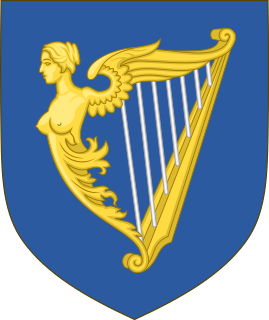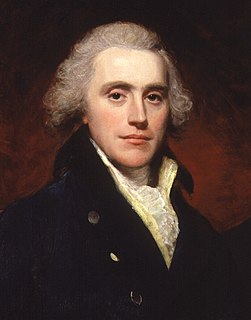Related Research Articles

The Irish House of Commons was the lower house of the Parliament of Ireland that existed from 1297 until 1800. The upper house was the House of Lords. The membership of the House of Commons was directly elected, but on a highly restrictive franchise, similar to the unreformed House of Commons in contemporary England and Great Britain. Catholics were disqualified from sitting in the Irish parliament from 1691, even though they comprised the vast majority of the Irish population.

The Acts of Union 1800 were parallel acts of the Parliament of Great Britain and the Parliament of Ireland which united the Kingdom of Great Britain and the Kingdom of Ireland to create the United Kingdom of Great Britain and Ireland. The acts came into force on 1 January 1801, and the merged Parliament of the United Kingdom had its first meeting on 22 January 1801.

The Irish House of Lords was the upper house of the Parliament of Ireland that existed from medieval times until 1800. It was also the final court of appeal of the Kingdom of Ireland.

The Parliament of Ireland was the legislature of the Lordship of Ireland, and later the Kingdom of Ireland, from 1297 until 1800. It was modelled on the Parliament of England and from 1537 comprised two chambers: the House of Commons and the House of Lords. The Lords were members of the Irish peerage and bishops. The Commons was directly elected, albeit on a very restricted franchise. Parliaments met at various places in Leinster and Munster, but latterly always in Dublin: in Christchurch Cathedral, Dublin Castle, Chichester House (1661–1727), the Blue Coat School (1729–31), and finally a purpose-built Parliament House on College Green.
Armagh or County Armagh was a parliamentary constituency in the House of Commons. It was replaced in boundary changes in 1983.
This is a list of people who have served as Lord Lieutenant of Carlow.
This is a list of people who have served as Lord Lieutenant of Sligo.
Athlone was a constituency represented in the Irish House of Commons until 1800. Between 1725 and 1793 Catholics and those married to Catholics could not vote. Following the Act of Union 1800 the borough became Athlone.

In the first Parliament to be held after the Union of Great Britain and Ireland on 1 January 1801, the first House of Commons of the United Kingdom was composed of all 558 members of the former Parliament of Great Britain and 100 of the members of the House of Commons of Ireland.
Cockermouth was the name of a constituency of the House of Commons of the Parliament of England in 1295, and again from 1641, then of the Parliament of Great Britain from 1707 to 1800 and of the Parliament of the United Kingdom from 1801 to 1918. It was a parliamentary borough represented by two Members of Parliament until 1868, and by one member from 1868 to 1885. The name was then transferred to a county constituency electing one MP from 1885 until 1918.
Events from the year 1800 in Ireland.
Antrim County was a constituency represented in the Irish House of Commons until 1800.

The Speaker of the Irish House of Commons was the presiding officer of the Irish House of Commons until its disestablishment in 1800.
Cork County was a constituency represented in the Irish House of Commons to 1800.
Dungarvan was a constituency represented in the Irish House of Commons until 1800.
William Mayne, 1st Baron Newhaven PC, known as Sir William Mayne, Bt, between 1763 and 1776, was a British merchant and politician who sat in the House of Commons from 1774 to 1790.
Sir John Allen Johnson-Walsh, 1st Baronet was an Irish landowner and Member of Parliament.
Joshua Cooper was an Irish landowner and politician from Markree Castle, near Collooney in County Sligo.
Robert Allen was an Irish politician.
References
- ↑ E. M. Johnston-Liik, MPs in Dublin: Companion to History of the Irish Parliament, 1692-1800 (Ulster Historical Foundation, 2006), p.67 (Retrieved 29 March 2020).